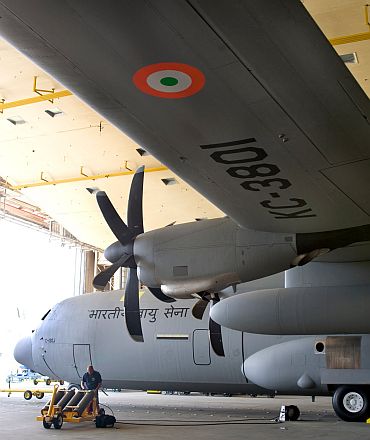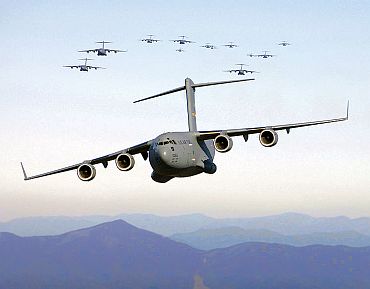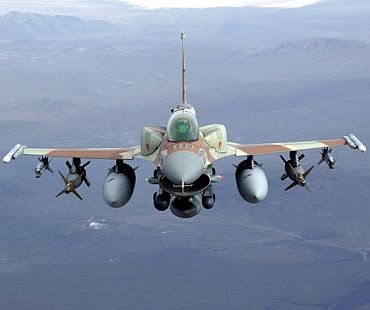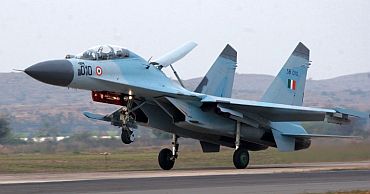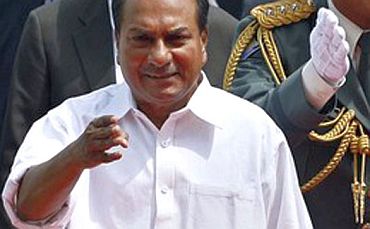 | « Back to article | Print this article |
We gave you N-deal, you give us defence deals
The battle to re-engine the Indian Air Force's 128 Jaguar fighter jets is in full throttle, with Britain's Rolls Royce and US' Honeywell International taking the war back home right inside the rarefied offices of South Block.
British Prime Minister David Cameron's recent comments in Bangalore on the "export of terror" by Pakistan have enormously pleased the Indian strategic establishment, but the fact is that India is already gearing up for the November visit of US President Barack Obama and is keenly aware that there is nothing like a defence deal to sweeten the mood.
For example, the Jaguar engine deal is worth an estimated $670 million, a lucrative sum in the recession-hit economies of the US and the UK, and definitely welcome in an era of rising unemployment, emptying treasuries and never-ending body bags from the AfPak war front.
US is pushing defence as 'central pillar' in ties
On the other hand, as India prepares to overhaul, upgrade and buy new defence equipment for its armed forces -- by 2022, military equipment worth $100 billion is likely to be purchased, besides another $9.7 billion on homeland security by 2016 -- and the world's top defence companies make a beeline for New Delhi's door, it is aware that defence cooperation is becoming its chief instrument in the pursuit of its foreign policy objectives.
That is why, as India and the US prepare for Obama's four-day India visit, Washington DC is pushing New Delhi to recognise that "defence cooperation is the central pillar" in the expanding bilateral partnership, the president of the US-India Business Council Ron Somers said.
According to Somers, deeper defence collaboration would not only generate thousands of jobs in India and the US (because of India's offset policy), but would also signal that the US is no longer an "unreliable supplier of defence goods as well as open up technological collaboration" in every sector.
Many Americans feel it's high time India compensates US for N-deal
Defence Minister A K Antony is visiting Washington DC towards the end of September, and even though India typically shies away from concluding defence deals during political visits, many Americans feel it's high time India compensates the US for the "heavy-lifting" it performed by pushing through the Indo-US civil nuclear deal from 2005-2008.
Typically, however, the government has followed the middle path so far, awarding the Hawk Advanced Jet Trainer deal to UK's BAE Systems, besides an additional $350 million to Rolls Royce for engines for the Hawk -- both for the IAF as well as for the Navy.
"For a middle power like Britain, that is good money," said an Indian official on the condition of anonymity.
Washington is eyeing the jewel in the crown
Meanwhile, over the last year, India has also bought nearly $6 billion worth of defence goods from the US, including six C-130 J "Super" Hercules transport planes (with the option to sell six more), 10 C-17 Globemaster-III strategic lift aircraft worth $3 billion (with the option to sell 10 more) as well as eight Boeing maritime surveillance P-8I aircraft worth $2.1 billion.
But since the jewel in the crown of the Indian defence market -- a 126-fighter jet order for the IAF's Medium Multi-Role Combat Aircraft (MMRCA) worth $11 billion -- is not going to be decided by the time Obama visits India, the US government is hoping that India will also favour Honeywell's F125IN thrust class engine over Rolls Royce's Adour MK 821engine for its Jaguar fleet.
"An enhanced defence relationship is of huge symbolic importance," one US official said, adding, "it sends a powerful political message on the marriage of doctrine and strategy."
India's strategic considerations are shifting
Indian officials admitted that although Russia continued to supply 70 per cent of the IAF's hardware, the MMRCA deal was significant not only because of the large number of new fighter jets IAF would buy, but because entire platforms worth many more billions would have to be purchased so as to sustain the proper use and maintenance of the jets.
But the US officials also admitted that the heightened interest in selling sensitive defence equipment to India was not limited to "transactional gains", but was also impelled by shifting strategic considerations in other parts of Asia.
The officials were not willing to name either Pakistan -- despite the exposes by Wikileaks of Pakistan's "double-game" on the AfPak warfront -- or China's recent belligerence in the Yellow Sea as serious causes of concern, but it's clear that for the first time since the Obama administration came to power, the US is both confused and bewildered about the manner in which it should confront China's rising power or Pakistan's blunt blackmail.
Today, India and US talk frankly
Beijing's warning that the US aircraft carrier, USS George Washington, should not exercise in the Yellow Sea has gone down very badly in Washington, and is being perceived a direct challenge to the security and safety of its treaty ally, South Korea.
In recent days, a compromise seems to have been struck, with Korea stating it would conduct exercises on its own.
On AfPak, conversations between India and the US are now dominated by considerable frankness, but the Sino-US relationship remains a far more complex issue.
US officials, pointing to China's incredible rise, say they would like India's help in maintaining Asia's security and stability, especially to keep the sea-lanes open for navigation.
There is still a long way to go
It is not clear whether Antony will sign three key pacts the US has been pushing for, like the Logistics Support Agreement (LSA), the Communication Inter-Operability Agreement (CISMOA) or the Basic Change and Cooperation Agreement for Geo-Spatial cooperation.
The US is keen that at least the CISMOA and the BECA be inked soon, arguing it will only pave the way for removing key Indian entities from the US export control list or that the transfer of high-tech avionics to India may not be possible.
But India remains unfazed, arguing that Indian entities like DRDO, ISRO and BEL should be removed on their own merit and that the "time has not yet come" for pacts like the LSA, which envisage US and Indian militaries providing logistics support, refuelling and berthing facilities for each other's warships and aircraft.

